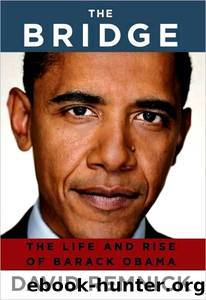The bridge: the life and rise of barack obama by David Remnick

Author:David Remnick [David Remnick]
Language: eng
Format: epub
Tags: Biographie, Politique
ISBN: 9781400043606
Published: 2010-09-15T19:12:24+00:00
The killing of Fred Hampton initiated the decline of the Black Panthers but became an emblematic moment in the history of race relations in Chicago. The murder thrust Bobby Rush, a far more awkward speaker than Hampton, into the leadership role of the Chicago Black Panthers. "Bobby is a good leader, but a quiet one," Seale said. Rush, who had worked hard to overcome a childhood stammer, did manage to express his insistence on bearing arms. At a speech to Chicago college students, he said, "I don't go around saying 'We shall overcome' unless I have a gun in my hand." In 1971, he served a six-month prison term for weapons possession.
The last real triumph of the Panthers before they left the political stage was the political defeat, in 1972, of Ed Hanrahan, who was running for re-election as state's attorney. The Panthers joined the conventional political campaign to throw him out of office. Hanrahan's defeat was hardly the only consequence of the police violence.
Hampton's murder was such a galvanizing event, Rush said, that it "laid the foundation" for Harold Washington's election as mayor. By 1974, though, the Panthers had played themselves out as a political force. "We'd gone from five thousand members to a few hundred at most," Seale said. In Chicago, at least, martyrdom was their most effective legacy. Rush quit the Black Panther Party to enroll at Roosevelt University, where he studied political science. He failed in an attempt to win a seat on the City Council and for a while he sold insurance to make a living. In 1983, the year of Washington's transformative victory, Rush, riding his coattails, was elected alderman from the Second Ward. On the City Council, Rush was a loyal Washington supporter in the endless "Council Wars," in which resentful white aldermen like "Fast Eddie" Vrdolyak blocked Washington's initiatives at nearly every turn.
In 1992, Rush decided to run for Congress, in Illinois's First Congressional District, challenging Charles Hayes, who had succeeded Washington after he was elected mayor. Hayes had been a founding member of Operation PUSH with Jesse Jackson and a supporter of King. The First District has long been a seat of great importance in black politics, and, in addition to Washington, Oscar De Priest, William Dawson, and Ralph Metcalfe were among those who had held it. More than seventy per cent of the district's residents are black, and it has been represented by an African-American politician longer than any other district in the country. It includes portions of Englewood, Woodlawn, Douglas, Oakland, Avalon Park, Chatham, Beverly, South Shore, and Hyde Park, along with suburban Oak Forest, Evergreen Park, and Blue Island. Rush was able to beat Hayes by reminding voters of his role in the Black Panthers and of a banking scandal involving Hayes, who had been discovered to have more than seven hundred overdrafts on his House checking account. It was a contest of racial bona fides and authenticity, and it got national attention. Soon after entering Congress, Rush said of his colleagues, "Some were amazed I didn't have bandoliers or a gun.
Download
This site does not store any files on its server. We only index and link to content provided by other sites. Please contact the content providers to delete copyright contents if any and email us, we'll remove relevant links or contents immediately.
The Secret History by Donna Tartt(16662)
The Social Justice Warrior Handbook by Lisa De Pasquale(11494)
Thirteen Reasons Why by Jay Asher(7802)
This Is How You Lose Her by Junot Diaz(5799)
Weapons of Math Destruction by Cathy O'Neil(5046)
Zero to One by Peter Thiel(4834)
The Myth of the Strong Leader by Archie Brown(4796)
Promise Me, Dad by Joe Biden(4455)
Beartown by Fredrik Backman(4434)
Stone's Rules by Roger Stone(4423)
How Democracies Die by Steven Levitsky & Daniel Ziblatt(4414)
The Fire Next Time by James Baldwin(4350)
100 Deadly Skills by Clint Emerson(4085)
A Higher Loyalty: Truth, Lies, and Leadership by James Comey(4040)
Rise and Kill First by Ronen Bergman(4021)
The David Icke Guide to the Global Conspiracy (and how to end it) by David Icke(3891)
The Farm by Tom Rob Smith(3878)
Secrecy World by Jake Bernstein(3788)
The Doomsday Machine by Daniel Ellsberg(3737)
